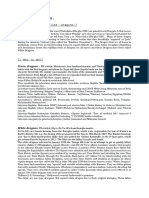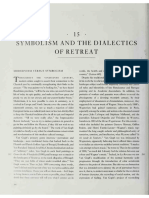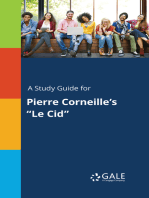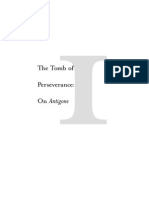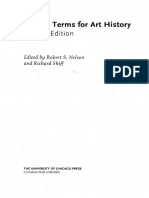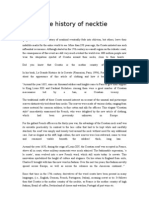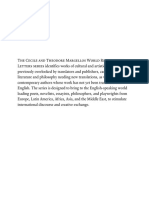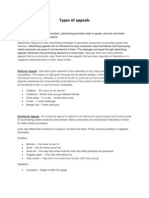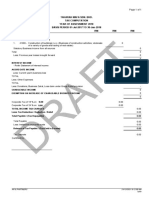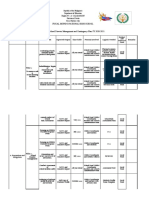Promethues
Promethues
Uploaded by
মৃন্ময় ঘোষCopyright:
Available Formats
Promethues
Promethues
Uploaded by
মৃন্ময় ঘোষOriginal Description:
Original Title
Copyright
Available Formats
Share this document
Did you find this document useful?
Is this content inappropriate?
Copyright:
Available Formats
Promethues
Promethues
Uploaded by
মৃন্ময় ঘোষCopyright:
Available Formats
PROMETHEUS UNBOUND
an analysis of the play by Percy Bysshe Shelley In Prometheus Unbound Percy Bysshe Shelley attempted to make one of the great [dramatic] poems of the world. It is the most ambitious poem of the Romantic Movement, and one of the most ambitious that ever was written. The very vastness of the poet's ambition produced beauties that could not have been in a humbler and more perfect work; but no poet, however great his genius, can achieve a masterpiece in the highest kind of poetry unless all circumstances conspire to favour him. Circumstances did not favour the romantic poets so much as to allow any one of them to produce one of the great poems of the world. Both the epic and the dramatic forms were dead when the Romantic Movement began; no efforts availed to bring them to life again, nor was any new form of poetry created in which all the romantic ideas and emotions could find a complete and coherent expression. Forms of this kind are imposed upon the poet rather than created by him, and they are imposed by a public that regards poetry as one of the ordinary pleasures of life. We may suppose that listening to epic poetry was such a pleasure to the audience of Homer. The later Greeks and the Elizabethans certainly enjoyed poetry in their plays, while, at the same time, they expected those plays to interest and excite them. Thus Homer and Aeschylus and Shakespeare were popular entertainers as well as great poets, and a task was imposed upon them by their public besides the task which they chose to make for themselves. But no such task was imposed upon the romantic poets, nor could they create a popular demand for any of the great forms of poetry. It is true that the narrative poems of Scott and Byron had a large sale; but nothing great was developed out of them, and Scott soon turned to prose, while Byron in "Don Juan" used poetry to make a game of itself, just as Mr. Bernard Shawsometimes uses the drama to make game of itself. Other romantic poets had higher ambitions, and tried to adapt the epic or the drama to their own purposes. But there was no purpose outside themselves to direct their adaptations. They were in the case of an architect who should set to work to design a great building without a commission or a site. He might imagine conditions for himself; but they would not enable him to develop a form, as the forms of the great Gothic Cathedrals were developed by all the conditions, material and spiritual, that were imposed on their builders. Thus when Wordsworth started to write the "Excursion" or the "Prelude" he had no one to please but himself, no difficulties to overcome except those which he chose to make. He had to set his own problem, and, naturally, he set one that was too easy. He was not subject to that external constraint by which alone the great forms of art can be developed; and so the "Prelude" and the "Excursion" are formless, their beauties casual and disconnected, their inspiration at the mercy of the poet's whims. So it was with Shelley when he wrote "The Revolt of Islam," and it is most wonderful that, when only a year later he wrote Prometheus Unbound, he should have produced a poem so much better in form. For the difficulties of Prometheus were enormous. The subject is one that would not suit any form of poetry that has ever been devised, and when Shelly treated it as a lyrical drama he only did so because all other forms were clearly impossible. His purpose was to express his sense of the present evil conditions of the universe, to represent a sudden miraculous change in that condition, and finally to sing the glory of the universe thus transformed. He had learnt too much about his art to treat this subject as he had treated it in "Queen Mab." He had done with sermonising fairies and magic tours through the past and future. He saw that he must express it in a myth; but, since there was no existing myth that suited his purpose, he had to make one for himself. The two chief characters in his myth have familiar names; but the story, as he tells it, is mainly his own invention. Aeschylus, besides his Prometheus Bound, wrote a lost play upon the liberation of Prometheus; but, as Shelley says in his preface, "the 'Prometheus Unbound' of Aeschylus supposed the reconciliation of Jupiter with his victim as the price of the disclosure of the danger threatened to his empire by the consummation of his marriage with Thetis." This story would not have suited Shelley's purpose at all. "I was averse," he says, "from a catastrophe so feeble as that of reconciling the champion of the oppressor of mankind. The moral interest of the fable ... would be annihilated if we could conceive of Prometheus as unsaying his high language, and quailing before his successful and perfidious adversary."
Shelley compares his Prometheus to the Satan of "Paradise Lost"; but he deliberately makes his archrebel his hero, gives him all the virtues, and ends the poem with his triumph. Thus his myth is of a new kind, and made to express the new ideas of an age of revolution. But men can form new ideas of the universe much more quickly than they can make new myths to express them; and for a poet not only to treat a myth in poetry, but also to invent the myth itself, is a task of almost insuperable difficulty. The great myths express, not one man's experience of life, but the experience of multitudes and generations. Shelley's myth expressed only his own rather limited experience and his own peculiar ideas, which were not so much the result as the cause of that experience. He seems to have been born with an overpowering desire for perfection, and an idea of it by which he tested all real things and found them wanting. It was never his object to reconcile himself to reality. Reality seemed to him to suffer from an organic disease of which it must be miraculously cured before he could consent to it. This idea of things he expressed in his myth. Prometheus represents all that is good in suffering humanity; Jupiter the tyrannous and external evil by which humanity is oppressed. Jupiter is suddenly and mysteriously overthrown, and Prometheus is freed. At once the universe is cured of its disease, and all things rejoice in common. This myth does not express any general conception of the nature of things; for the great mass of men, however little they may think about the order of the universe, have a sense that evil is in the nature of man and to some extent his own fault, not imposed upon him by a celestial tyrant. Men have tortured their minds with trying to discover the origin of evil; but even the most despairing have seldom imputed it to the tyranny of a god, at least not since they have developed moral ideas and got some mastery over nature. Nor have they entertained the notion that the universe might be freed at a stroke from a celestial tyranny. Ideas of the millenium are usually based upon a belief that mankind will some day purge themselves of their guilt or be forgiven by God. Now men will accept a myth which expresses their own conception of the universe, even if it explains nothing. But they are not likely to accept one which is contrary to their conception, unless it not only expresses but explains. Shelley's myth, of course, explains nothing. How could it? He assumes the wickedness of Jupiter and the goodness of Prometheus. But Jupiter's wickedness has no motive, and his overthrow is causeless. Something happens in the middle of the play; but Shelley cannot tell us what it is, because he does not know. Demo-gorgon appears and descends with Jupiter into the abyss; but we do not learn why he appears or how he contrives the fall of Jupiter, or even who he is, except that he is Eternity and the child of Jupiter, as Jupiter of Saturn. The names of Jupiter and Prometheus are familiar to us, but we are not accustomed to think of them as personifications of evil and good. Therefore Shelley could make little or no use of whatever tradition had gathered round them, and he was forced to insist always upon the qualities with which he had chosen to invest them. Here he was at a great disadvantage compared with Milton, who, in "Paradise Lost," was not bound to be for ever describing the wickedness of Satan since that was taken for granted, and who could therefore insist rather upon his ruined splendour and perverse courage. Shelley's Jupiter had to be wicked or nothing; and he has no qualities except wickedness. But Shelley knew nothing about wickedness. To him it was an arbitrary mystery. Therefore he was quite content to represent it as arbitrarily overthrown. In his simple, passionate view of life something must happen sooner or later, to change the nature of things. Like an early Christian, he looked forward to the millenium; but not being one of an expectant community, nor living in an age of creative faith, he had to make his vision of the millenium out of his own single imagination. There were no widespread rumours or prophecies, no general confidence, to which he could appeal. Even the most visionary appeals of his time were made to men to emancipate themselves by revolutions of their own contriving. Shelley's intellect could concern itself with political processes, but his imagination could not be fired by them; that was drawn into a desire for perfection and a sudden supernatural abolition of all evil, and it rushed past all consideration of the means by which this could come about to a contemplation of perfection itself. Indeed, his imagination, naturally religious, was logical in its disregard of the means of deliverance. Since he conceived of evil as imposed on man by a supernatural tyranny, a supernatural revolution was necessary for his deliverance. Now the drama is a means of representing action, and in Shelley's myth there is no action. A poet who would represent something in action must have some knowledge of what he represents. Shelley had no knowledge either of the nature of evil, or of the means by which evil can be abolished; therefore he could
not represent either. Matthew Arnold, following Aristotle, says in his preface to his poems of 1853 that all representation based on knowledge are interesting. "What is not interesting is that which does not add to our knowledge of any kind; that which is vaguely conceived, and loosely drawn; a representation which is general, indeterminate, and faint, instead of being particular, precise, and firm." It is certain that Shelley's attempt to represent action in Prometheus Unbound do not add to our knowledge, and that they are not interesting. Demogorgon was to him a mere symbol of the unknown; and he remains a mere symbol to us, as bare of all associations as an algebraic X. But I can best show how much the poem lacks action by a short account of it. In the first act Prometheus is discovered bound to a precipice in the Indian Caucasus. There are no events except that the curse is repeated which long ago Prometheus had uttered against Jupiter, and which now, purified by suffering, he would recall; also that Mercury, with the Furies, comes to Prometheus, asks him to tell his secret and make submission to Jupiter, and, when he refuses, sets the Furies loose upon him. The Furies torture him with tales of how all the good in the world is perverted to evil; and then give place to a chorus of Spirits "whose homes are the dim caves of human thought," and who sing of what in human life is prophetic of the good that is to be. In the second act there is still less action. Prometheus does not appear at all. The chief characters are Asia and Panthea, who with a third, Ione, are described in the Dramatis Personae as Oceanides. It is difficult to distinguish between them, except that Asia is the lover of Prometheus, and mourns for him in exile in a vale in the Indian Caucasus, where the first scene of the second act takes place. To her comes Panthea and tells of a dream in which she had seen Prometheus transformed by love, and in which he had murmured Asia's name. Asia looks into the eyes of Panthea, and sees in them Prometheus transformed as in Panthea's dream. Then another dream of hers appears, in which she had forgotten, and calls on them to follow it. The dream passes into Panthea's mind and then into Asia's. In it-"A wind arose among the pines; it shook The clinging music from their boughs, and then Low, sweet, faint sounds, like the farewell of ghosts, Were heard: O, follow, follow, follow me!" They hear echoes crying, "Follow, follow," and pursue them, passing into a forest intermingled with rocks and caverns. Here the second scene of the act takes place, with wonderful songs of Spirits, and with a dialogue between two young fauns about the nature of those Spirits. Following the echo Asia and Panthea come to the cave of Demogorgon, which they enter, summoned by a song of Spirits. There they see "A mighty darkness Filling the seat of power, and rays of gloom Dart round, as light from the meridian sun, Ungazed upon and shapeless; neither limb, Nor form, nor outline." This is Demogorgon, and, in answer to their questions, he tells them that God made the living world and all that it contains. They ask him "who made terror, madness, crime, remorse?" And he answers, "He reigns." "Jove is the supreme of living things." And yet "All Spirits are enslaved that serve things evil." Therefore Jove must be a slave. When they ask who is his master, Demogorgon replies-"If the abysm Could vomit forth its secrets.... But a voice Is wanting, the deep truth is imageless; For what would it avail to bid thee gaze On the revolving world? What to bid speak
Fate, Time, Occasion, Chance and Change? To these All things are subject but eternal Love." Asia then asks when the destined hour of the deliverance of Prometheus will come. Demogorgon shows her the Hours, wild-eyed charioteers driving rainbow-winged steeds. There is one Spirit with a dreadful countenance. Asia asks what it is, and it replies-"I am the shadow of a destiny More dread than is my aspect: ere yon planet Has set, the darkness which ascends with me Shall wrap in lasting night heaven's kingless throne." The Spirit ascends his chariot, and drives off among the stars, "blackening the night." Another Spirit appears with "the dove-like eyes of hope," and, for chariot, an ivory shell inlaid with crimson fire. He carries Asia and Panthea away with him, and the next scene finds them on the top of a snowy mountain. The Spirit tells them that the sun will not rise till noon. Apollo is held in heaven by wonder, and light is flowing from Asia. Panthea looks at her, and sees that she is changed. "I scarce endure The radiance of thy beauty. Some good change Is working in the elements, which suffer Thy presence thus unveiled." Then a voice is heard in the air singing the most wonderful song, "Life of Life, thy lips enkindle!" And Asia replies with the lyric, "My soul is an enchanted boat." So the act ends. The third act opens in Heaven. Jupiter is seated on his throne. He exults in his secure omnipotence. Hitherto only the soul of man has rebelled against it. But now he has begotten a strange wonder-"Who waits but till the destined hour arrive, Bearing from Demogorgon's vacant throne The dreadful might of ever-living limbs Which clothed that awful Spirit unbeheld, To redescend and trample out the spark. This is his child by Thetis, whose incarnation he now expects. The car of the Hours approaches, and he hails its approach with cries of victory. But there descends from it Demogorgon himself. Jupiter asks him what he is, and he replies-"Eternity. Demand no direr name. Descend, and follow me down the abyss. I am thy child as thou wert Saturn's child; Mightier than thee: and we must dwell together Henceforth in darkness." Jupiter, after a brief defiance, cries for mercy; but in vain, and the two together-"Sink on the wide waves of ruin, Even as a vulture and a snake outspent Drop, twisted in inextricable fight, Into a shoreless sea."
In the next scene there is a short dialogue between Apollo and Ocean, in which Apollo tells of the fall of Jupiter, and Ocean, in beautiful lines, says that she will no longer be vexed with tempests. In the third scene Prometheus is unbound by Hercules in the presence of Asia, Panthea, Ione, the Earth and other Spirits. Prometheus tells how he will spend his happiness with Asia, and orders the Spirit of the Hour to travel round the world in her car, sounding the music of deliverance. The Earth says that henceforth all her children shall live in happiness together-"Night-folded flowers Shall suck unwithering hues in their repose: And men and beasts in happy dreams shall gather Strength for the coming day and all its joy: And death shall be the last embrace of her Who takes the life she gave, even as a mother Folding her child, says 'Leave me not again.'" Asia asks whether the dead cease to love and move, and breathe and speak. The Earth says it would avail not to reply-"Thou art immortal, and this tongue is known But to the uncommunicating dead. Death is the veil which those who live call life: They sleep, and it is lifted." Then the Earth tells them of a cave where there is a temple built by men who became mad, inhaling the madness of the Earth herself in the evil time. Now that madness is past, and a Spirit shall guide them to the cave. The Spirit appears in the likeness of a winged child, and in the fourth scene Prometheus, Asia, Panthea, Ione, and the Spirit of the Earth are in front of the cave. Panthea tells how the Spirit of the Earth, in the time before the tyranny of Jupiter, had loved Asia-"And with her It made its childish confidence, and told her All it had known or seen, for it saw much, Yet idly reasoned what it saw." The Spirit of the Earth now joyfully returns to Asia, and tells of the wonderful change that has come over the world. Then the Spirit of the Hour enters and tells of the same change, and how throne, altars, judgment-seats, and prisons now stand, not overthrown, but unregarded. So the act ends. The fourth act was an afterthought. Shelley wrote it, no doubt, that he might have full scope for expressing the rapture of the delivered universe. It is like the triumphant finale of a symphony, with variety of form but none of emotion, except what comes from contrasting present good with past evil. There is a long duet between the Earth and the Moon, each echoing the delight of the other; and at the end of it Demogorgon addresses them both, and all the stars, and the happy dead, and the elemental genii-"Who have homes from man's high mind even to the central stone Of sullen lead; from Heaven's star-fretted domes To the dull weed some sea-worm battens on." And all beasts and birds, and leaves and buds, and the lightning and wind, and last of all-"Man who wert once a despot and a slave;
A dupe and a deceiver; a decay; A traveller from the cradle to the grave Through the dim night of this immortal day." His address ends the poem with the praise of Prometheus. This short account of Prometheus Unbound will show how difficult Shelley found it to adapt his subject to a dramatic form. He was often hard put to it to make anything happen at all. There is only one great event in this drama, namely, the fall of Jupiter, and that is causeless; nor are we made to understand how or why it produces the effects which come of it. Apart from this there is movement but not action. The characters drift about aimlessly in magic cars or led by Echoes and Spirits. And most of them are so abstract that we do not even know who they are or what relation they bear to each other. There is no explanation of Asia, Panthea, and Ione except that they are sister Oceanides and that Asia loves Prometheus. Even the significance of their names is obscure. Then there are Earth and Ocean and the Spirits of the Earth and of the Moon; and, since the Earth herself is personified, it is difficult to find a distinction between her and the Spirit of the Earth. These characters are uninteresting in themselves because they tell us nothing about themselves, and because Shelley seems to know nothing about them. There are also incidents which bewilder rather than interest. Thus, in the first act Prometheus wishes to hear again the curse which he had uttered against Jupiter, because he would recall it. Nothing earthly dare repeat it to him. But the Earth tells him that there is a world underneath the grave-"Where do inhabit The shadows of all forms that think and live Till death unite them and they part no more." There are the phantasms of Prometheus himself, of Demogorgon, and of Jupiter. If he will, he may summon up one of them to repeat the curse. He will not have it repeated by anything resembling himself, so he summons the phantasm of Jupiter. If this is only a device of Shelley's to have the curse repeated it is not worth the space given to it, and I can see no further significance in it. There are other episodes that seem to be mere pretexts for lyrical poetry, such as that in the first and second scenes of the second act, when Asia and Panthea are led by echoes to the cave of Demogorgon, and choruses of Spirits sing wonderful songs about their way. And when they find Demogorgon and question him about the nature of the universe, he of course can tell them no more than Shelley knows, so that very little comes of their visit. Throughout the poem there are attempts to explain things, which only leave the reader bewildered and unsatisfied, like the same attempts in "Paradise Lost." Poets, like all other writers, must fail when they try to tell us what they do not know themselves. Shelley lacked, more than most poets, that kind of knowledge which is needed for the representation of action; and whatever action there is in Prometheus Unbound belongs to a state of being about which no man could know anything. We cannot therefore regard the poem as a drama; and the question arises whether it has any form at all, or whether the plot is only a pretext for a number of separate poems. Now the great value of form in a work of art is that it gives a cumulative power to all the parts and details of that work. They are not there for their own sake but in the accomplishment of a purpose outside them, and their beauties please us the more as we see them in relation to that purpose. Therefore, before we dogmatise about the lack of form in Prometheus Unbound, we must consider whether the poem has any cumulative power; and no one, I think, can read it without seeing that it has. This cumulative power does not come from the action, but from the emotion which the characters and the plot are a mere machinery for expressing. Shelley himself called the poem a lyrical drama, and it is, in fact, one extended and diversified lyric, uttered now by one singer, now by another, and now by choruses. And as in a lyric of ordinary length we have to assume, or to gather from slight suggestions, the cause of the emotion expressed, so
in Prometheus we have really to assume the action and the circumstances which are pretexts for the expression of emotion. There is always a tendency in the poetic drama to become lyrical, to concern itself more with emotional effects than with the action that causes them; and the more lyrical a drama becomes, the nearer it approaches to music, and particularly to the symphony.Prometheus Unbound is nearer to music than any other drama I know, and in form it is nearer to symphony than to drama. In a symphony we often hear one movement expressing trouble and desire, followed by another expressing attainment and delight, without, of course, any expression of the means by which desire is accomplished. Yet the movements are related to each other, because the same desire which is expressed in one is accomplished in the other. There is, in fact, a unity and a cumulative power of emotion; and there seems to be the same unity and cumulative power in Prometheus Unbound. Being poetry and not music, it is, of course, to be judged as poetry; and, as I have tried to show, it fails to solve some of the problems peculiar to that art, or at least, to the form of that art in which it is written. But Shelley was a great innovator in poetry. He brought it nearer to music than it had ever been brought before, nearer to complete fusion of emotion and idea. And innovators are sure to have trouble with their machinery, especially when they are young and inexperienced. The machinery of Prometheus belongs to the past, and Shelley could only adapt it very imperfectly to his purpose. That purpose was to present idea and emotion all in one. He was not content with lyrical poetry of pure emotion; more than any other poet he was moved to emotion by ideas, and that is the reason why his emotions were so persistent and needed a long poem for their expression. Other poets have been moved to different emotions by particular events and experiences, and have expressed them either in short lyrics or in incidental passages of drama or narrative. Thought and experience and the spectacle of the universe all continually aroused the same emotion in Shelley, because he was always possessed by the same ideal. All emotions are caused by a comparison of the real with the ideal, and are delightful when the real seems to harmonise with the ideal, and painful when there is discord between them. In Shelley's mind ideals were always predominant and always the same, incessantly compared with the real, and incessantly producing the same emotion through that comparison. He was like an angel strayed on to the earth, and by all experience provoked to contrast his present state with his past. He could not, like Shakespeare or Rembrandt love things of the earth for their own sake. His ideals possessed him as some men are possessed by appetites, and they produced emotions so quickly out of experience that they often prevented him from seeing the true nature and significance of experience. But still they were real emotions, produced by his own ideals out of his own experience. He has been called a visionary, but he was not one of those visionaries who shut themselves up with their own ideal away from reality. He was always in fierce conflict with a great part of reality, and out of that conflict came the experience and emotion which he expressed inPrometheus Unbound.
You might also like
- Questions About DRAGONS: 1) Why Are They Called Dragons'?: Green Dragons: FA RacesDocument3 pagesQuestions About DRAGONS: 1) Why Are They Called Dragons'?: Green Dragons: FA RacesAvery Clover100% (2)
- Song of The Lark - An AnalysisDocument9 pagesSong of The Lark - An Analysiskroo427100% (1)
- Prometheus Unbound - Paper 1 - Engl 222Document7 pagesPrometheus Unbound - Paper 1 - Engl 222api-253726524No ratings yet
- Hallward - Bernard-Marie Koltes and Relations of InterestDocument20 pagesHallward - Bernard-Marie Koltes and Relations of InterestagonhamzaNo ratings yet
- Eisenman, Stephen - Symbolism and The Dialectics of RetreatDocument34 pagesEisenman, Stephen - Symbolism and The Dialectics of Retreatmarcusdanny100% (1)
- Apprehending The Idea Through Poetry and Danse - On MallarméDocument8 pagesApprehending The Idea Through Poetry and Danse - On MallarméDannyNo ratings yet
- Copjec Antigone-ImagineThere'SNoWoman 03Document36 pagesCopjec Antigone-ImagineThere'SNoWoman 03Hernan Cuevas ValenzuelaNo ratings yet
- Euripides' Medea and The Vanity of LogoiDocument19 pagesEuripides' Medea and The Vanity of Logoitemporarily digital ghostNo ratings yet
- Marsden, Jill - Review of Inner TouchDocument11 pagesMarsden, Jill - Review of Inner TouchCostin ElaNo ratings yet
- Appropriation NelsonDocument16 pagesAppropriation NelsonMarine DécheletteNo ratings yet
- Araby by James JoyceDocument44 pagesAraby by James Joyceমৃন্ময় ঘোষ100% (1)
- War Poets English Literature CourseDocument16 pagesWar Poets English Literature CourseAlexandra MihaiNo ratings yet
- In Flanders Fields and Other PoemsDocument101 pagesIn Flanders Fields and Other Poemscasca01No ratings yet
- Prometheus Unbound by Percy Bysshe ShelleyDocument3 pagesPrometheus Unbound by Percy Bysshe Shelleyannakk795No ratings yet
- Euripides Alcestis PDFDocument2 pagesEuripides Alcestis PDFJohn0% (1)
- Aeschylus' Agamemnon - NotesDocument3 pagesAeschylus' Agamemnon - NotesKusal JayasingheNo ratings yet
- Theodore Buckley The Art of Poetry of AristotleDocument68 pagesTheodore Buckley The Art of Poetry of AristotleBart MazzettiNo ratings yet
- Candide's Garden (William F. Bottiglia)Document17 pagesCandide's Garden (William F. Bottiglia)ROBSON100% (1)
- Plural Feet,: Sprung RhythmDocument8 pagesPlural Feet,: Sprung RhythmEcaterina AlbuNo ratings yet
- 30224233Document4 pages30224233Fabiola GonzálezNo ratings yet
- Artaud, Various Writings On Cinema From Collected Works Volume IIIDocument37 pagesArtaud, Various Writings On Cinema From Collected Works Volume IIIrichardjcam100% (1)
- BETENSKY 1978 Aeschylus' Oresteia The Power of ClytemnestraDocument15 pagesBETENSKY 1978 Aeschylus' Oresteia The Power of ClytemnestraCeciliaNo ratings yet
- SHAKESPEAREAN TRAGEDY and A C BradleyDocument24 pagesSHAKESPEAREAN TRAGEDY and A C Bradleyaamith7076No ratings yet
- The History of NecktieDocument1 pageThe History of NecktieandrewNo ratings yet
- Catullus 3Document73 pagesCatullus 3Eloy Medina OrvizNo ratings yet
- Eugene Mahon - The Death of HamnetDocument20 pagesEugene Mahon - The Death of HamnetJimmy NewlinNo ratings yet
- Alcestis and The Cocktail PartyDocument13 pagesAlcestis and The Cocktail PartyAurelia Corbana100% (1)
- ΜΑΥΡΗ ΓΑΤΑ: THE TRAGIC DEATH AND LONG AFTER-LIFE OF ANESTIS DELIASDocument34 pagesΜΑΥΡΗ ΓΑΤΑ: THE TRAGIC DEATH AND LONG AFTER-LIFE OF ANESTIS DELIASMelodeath23No ratings yet
- Hester 1980 Deianeira's Deception SpeechDocument8 pagesHester 1980 Deianeira's Deception SpeechGesthimani SeferiadiNo ratings yet
- A Greek Theater of IdeasDocument26 pagesA Greek Theater of IdeasMilton100% (1)
- Romeo Castellucci "Schwanengesang D744" by Daniel SackDocument5 pagesRomeo Castellucci "Schwanengesang D744" by Daniel SackdoctornodNo ratings yet
- Comedy - Tragedy - and - Universal - Structures en CastellucciDocument13 pagesComedy - Tragedy - and - Universal - Structures en CastellucciagustinaaragonNo ratings yet
- Socrates ' Versatile Rhetoric and The Soul of The Crowd : Avid ÉvystoneDocument21 pagesSocrates ' Versatile Rhetoric and The Soul of The Crowd : Avid Évystoneapi-516557147No ratings yet
- Mallarmé and The Experience of ArtDocument8 pagesMallarmé and The Experience of Artjosesecardi13No ratings yet
- BerniniDocument4 pagesBerniniEstela ArusteiNo ratings yet
- Eurykleia and Odysseus' Scar: Odyssey 19.393-466Document3 pagesEurykleia and Odysseus' Scar: Odyssey 19.393-466aristarchos76No ratings yet
- Three Phaedra's EssayDocument18 pagesThree Phaedra's EssayJismi ArunNo ratings yet
- Letter To MenoeceusDocument3 pagesLetter To MenoeceusmahudNo ratings yet
- Women of CairoDocument313 pagesWomen of CairoluisimbachNo ratings yet
- Trisha Donnelly Exhibition PosterDocument2 pagesTrisha Donnelly Exhibition PosterThe Renaissance SocietyNo ratings yet
- Why Should I Dance - Choral Self-Referentiality in Greek TragedyDocument57 pagesWhy Should I Dance - Choral Self-Referentiality in Greek TragedyStella Ofis AtzemiNo ratings yet
- Jan Kott Shakespeare Our ContemporaryDocument8 pagesJan Kott Shakespeare Our ContemporaryelsaNo ratings yet
- Crossroads Poetics Text Image Music Film PDFDocument30 pagesCrossroads Poetics Text Image Music Film PDFMiguel Prida100% (1)
- The Work of Louis Gernet PDFDocument26 pagesThe Work of Louis Gernet PDFpreformanNo ratings yet
- Margellos PoetryDocument105 pagesMargellos PoetryMaiah Phylicia LatoyaNo ratings yet
- Illusion, Empathy and The Lover in Shakespeare's Sonnets and Venus and AdonisDocument6 pagesIllusion, Empathy and The Lover in Shakespeare's Sonnets and Venus and AdonisAnushkaSenNo ratings yet
- Archaic Torso of ApolloDocument6 pagesArchaic Torso of Apollopequianome100% (1)
- Nature Landscape in PoetryDocument9 pagesNature Landscape in PoetryMrigakshiNo ratings yet
- Rancière, J., The Archaemodern TurnDocument18 pagesRancière, J., The Archaemodern TurnEmmanuelNo ratings yet
- What Is Sophocles Saying About Heroic Values in AjaxDocument3 pagesWhat Is Sophocles Saying About Heroic Values in AjaxGayatri GogoiNo ratings yet
- The Epic CycleDocument2 pagesThe Epic CycleGail CariñoNo ratings yet
- Friedrich Nietzsche and German Expressio PDFDocument288 pagesFriedrich Nietzsche and German Expressio PDFCarlos De Landa AcostaNo ratings yet
- Deleuz & Film AnalysisDocument8 pagesDeleuz & Film AnalysisFarid AhmadNo ratings yet
- Euripides' Orestes, The Quest For SalvationDocument18 pagesEuripides' Orestes, The Quest For SalvationelliroussNo ratings yet
- KAVAFY CONSTANTINEPOETRY EnglishGreekDocument70 pagesKAVAFY CONSTANTINEPOETRY EnglishGreekmetania01No ratings yet
- Roland BarthesDocument10 pagesRoland Bartheshpowers1968No ratings yet
- Plays by Ostrovsky, Aleksandr Nicolaevich, 1823-1886Document205 pagesPlays by Ostrovsky, Aleksandr Nicolaevich, 1823-1886Gutenberg.org100% (1)
- Post Human VisionsDocument20 pagesPost Human VisionsGuilherme PereiraNo ratings yet
- Santamaria, M. A. "Critical Notes To The Orphic Poem of The Derveni Papyrus", ZPE 182, 55-76Document24 pagesSantamaria, M. A. "Critical Notes To The Orphic Poem of The Derveni Papyrus", ZPE 182, 55-76masanta11No ratings yet
- Sappho: One Hundred Lyrics.Document73 pagesSappho: One Hundred Lyrics.Zubair Hossain ImonNo ratings yet
- Fantasy and The ImaginationDocument4 pagesFantasy and The ImaginationAbisola AwariNo ratings yet
- Electra and the Empty Urn: Metatheater and Role Playing in SophoclesFrom EverandElectra and the Empty Urn: Metatheater and Role Playing in SophoclesRating: 3 out of 5 stars3/5 (1)
- OBC-A & OBC-B Category: Important Announcement Addendum To Advt. No. 10 (5) /2014Document1 pageOBC-A & OBC-B Category: Important Announcement Addendum To Advt. No. 10 (5) /2014মৃন্ময় ঘোষNo ratings yet
- Oxford University PressDocument10 pagesOxford University Pressমৃন্ময় ঘোষNo ratings yet
- Primary BooksDocument4 pagesPrimary Booksমৃন্ময় ঘোষNo ratings yet
- The Superannuated ManDocument3 pagesThe Superannuated Manমৃন্ময় ঘোষNo ratings yet
- English in The Indian SubcontinentDocument4 pagesEnglish in The Indian Subcontinentমৃন্ময় ঘোষNo ratings yet
- The Hollow Men SummaryDocument11 pagesThe Hollow Men Summaryমৃন্ময় ঘোষ0% (1)
- Bio Data0Document1 pageBio Data0মৃন্ময় ঘোষNo ratings yet
- New Syllabus of Class 11Document3 pagesNew Syllabus of Class 11মৃন্ময় ঘোষNo ratings yet
- A.K RamanujanDocument3 pagesA.K Ramanujanমৃন্ময় ঘোষNo ratings yet
- New Syllabus of Class 11Document3 pagesNew Syllabus of Class 11মৃন্ময় ঘোষNo ratings yet
- F.R. Leavis-Excerps From The Great TraditionDocument4 pagesF.R. Leavis-Excerps From The Great Traditionমৃন্ময় ঘোষNo ratings yet
- BeckettDocument34 pagesBeckettমৃন্ময় ঘোষNo ratings yet
- (Port Blair 2nt + Havelock 1nt + Neil 1nt) TAT-SUBHANKAR-1167Document6 pages(Port Blair 2nt + Havelock 1nt + Neil 1nt) TAT-SUBHANKAR-1167Shubhadip GhoshNo ratings yet
- United States v. Reggie Leroy, United States of America v. Darren Harris, 984 F.2d 1095, 10th Cir. (1993)Document7 pagesUnited States v. Reggie Leroy, United States of America v. Darren Harris, 984 F.2d 1095, 10th Cir. (1993)Scribd Government DocsNo ratings yet
- The Ghanaian Dancing Pallbearer EssayDocument2 pagesThe Ghanaian Dancing Pallbearer EssayRaffNo ratings yet
- Cat Hybrid Energy Solutions V3A Summary 202009Document77 pagesCat Hybrid Energy Solutions V3A Summary 202009Chris StillNo ratings yet
- Facebook Case StudyDocument16 pagesFacebook Case StudyWarren VanName100% (2)
- Types of Appeals: Rational Appeal: Ads Which Give Reasons To The Customers To Buy Their Products and Not of TheirDocument2 pagesTypes of Appeals: Rational Appeal: Ads Which Give Reasons To The Customers To Buy Their Products and Not of TheirJesse JhangraNo ratings yet
- Fyp PosterDocument1 pageFyp Posterhaziq hilmiNo ratings yet
- Bortun 2012 - Country Image ManagementDocument5 pagesBortun 2012 - Country Image ManagementAlice Rose Marie DumitracheNo ratings yet
- FDA: Wendy's Durian Candy Tainted With Bacteria: Refuerzo, Maria Godesa F. 4Fph Pharchm 4 HWDocument2 pagesFDA: Wendy's Durian Candy Tainted With Bacteria: Refuerzo, Maria Godesa F. 4Fph Pharchm 4 HWDesa RefuerzoNo ratings yet
- Bhagyanagar Plot Owners Welfare ... Vs State of Telangana On 4 June, 2019Document30 pagesBhagyanagar Plot Owners Welfare ... Vs State of Telangana On 4 June, 2019Shashank GinjupalliNo ratings yet
- ACSID - New Eng File Elem Unit 1A, PP 4,5 WORDDocument7 pagesACSID - New Eng File Elem Unit 1A, PP 4,5 WORDHassina OuziaNo ratings yet
- Diferencias As:like + Likely:Probably PDFDocument3 pagesDiferencias As:like + Likely:Probably PDFSashaNo ratings yet
- Last Quarter Exam - TrendsDocument6 pagesLast Quarter Exam - TrendsRamwen Jamero100% (1)
- Document 0Document16 pagesDocument 0Ruby QienNo ratings yet
- ABS-CBN Broadcasting Corp. v. TajanlangitDocument21 pagesABS-CBN Broadcasting Corp. v. TajanlangitJerome OppusNo ratings yet
- Group Assignment Analyzing Financial Statement of VinamilkDocument24 pagesGroup Assignment Analyzing Financial Statement of VinamilkNhư ThảoNo ratings yet
- 2023-05OQI (Gun Ban Blank)Document3 pages2023-05OQI (Gun Ban Blank)Lholi Alnajib HajanNo ratings yet
- 8 Heirs of Favis SR Vs GonzalesDocument10 pages8 Heirs of Favis SR Vs GonzalesKyla Lyka ApyamNo ratings yet
- Assessment of Nutritional Status of Under Five ChildrenDocument39 pagesAssessment of Nutritional Status of Under Five ChildrenJessica ChidimmaNo ratings yet
- Customer Perceived Satisfaction On Online ShoppingDocument28 pagesCustomer Perceived Satisfaction On Online ShoppingCasey AbelloNo ratings yet
- THI1997 - Hitachi 5 Days CourseDocument2 pagesTHI1997 - Hitachi 5 Days CourseJoão De Deus Oliveira CriscuoloNo ratings yet
- Cyber Security Audit Sample Report v2.1 PDFDocument6 pagesCyber Security Audit Sample Report v2.1 PDFOmmscon GroupNo ratings yet
- Upsc 2022 GS 2 Notes by Ias NetworkDocument292 pagesUpsc 2022 GS 2 Notes by Ias NetworkBiJu BairagiNo ratings yet
- Sudhir Kumar: RF Engineering/ Networking/ Technical SupportDocument2 pagesSudhir Kumar: RF Engineering/ Networking/ Technical SupportCharles WeberNo ratings yet
- The Emphasised Bible New Tastament 1878Document522 pagesThe Emphasised Bible New Tastament 1878rgrg100% (2)
- Elaf-Company ProfileDocument11 pagesElaf-Company ProfileElaf cargoNo ratings yet
- History of ManagementDocument19 pagesHistory of ManagementShushank Verma100% (1)
- Mustafa Plastic Recycling BP - RevisedDocument31 pagesMustafa Plastic Recycling BP - RevisedJoey MWNo ratings yet
- FMNHS School Disaster Management and Contingency Plan (SY 2020-2021)Document4 pagesFMNHS School Disaster Management and Contingency Plan (SY 2020-2021)Arnold Herrera EspineliNo ratings yet
